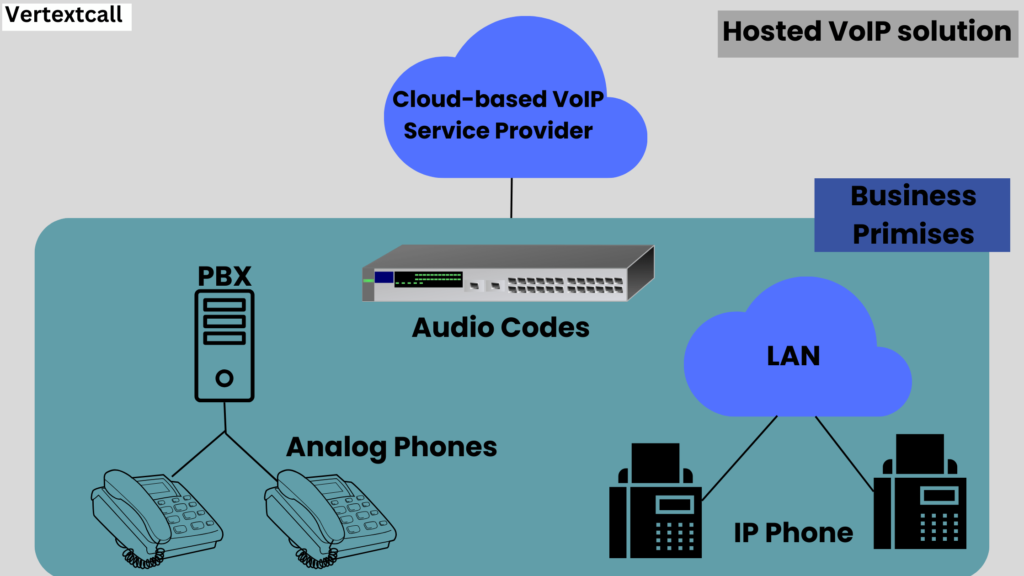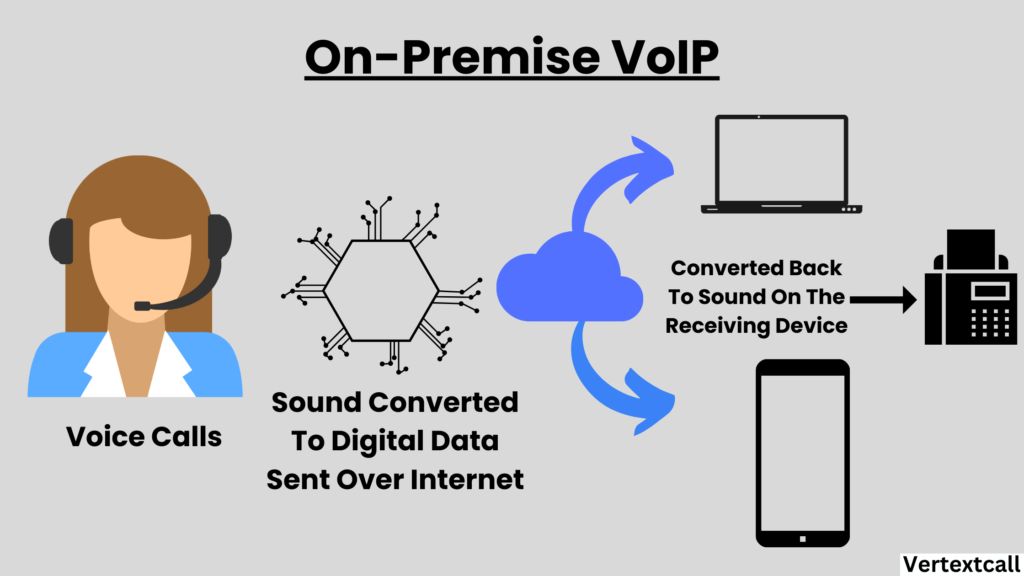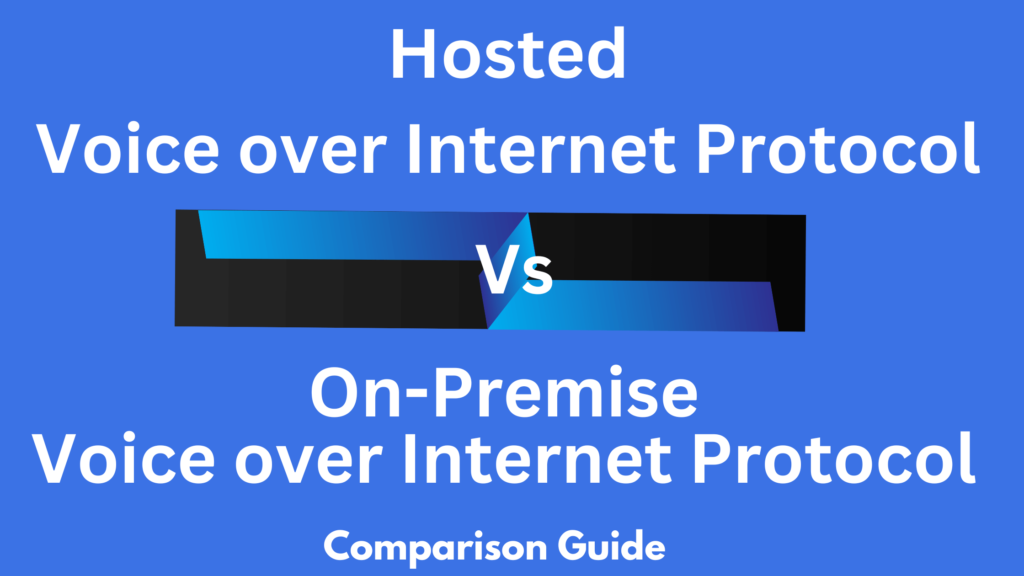Voice over Internet Protocol (VoIP) has revolutionized the way businesses communicate. However, when it comes to implementing VoIP, businesses face a critical decision that could significantly impact their operations — choosing between hosted VoIP and on-premise VoIP solutions.
For businesses the choice is not just about technology; it’s about finding the perfect balance between functionality, cost, and management. This detailed comparison will equip you with the insights needed to determine which VoIP solution best aligns with your business strategy.
What is a Hosted VoIP solution?
A Hosted VoIP Solution, sometimes referred to as a cloud-based VoIP system, is a service where the VoIP infrastructure and services are hosted by a third-party provider outside of your business premises.
This model transfers the responsibility of managing, maintaining, and upgrading the VoIP infrastructure to the service provider, thus simplifying operations for businesses.
Opting for a hosted solution means that your enterprise can leverage advanced communication features without the need for significant upfront investments in hardware or specialized IT staff for system management.
Related Stas:
According to research when businesses made the move to cloud computing, a significant 82% reported notable cost savings. This shift allowed companies to streamline their operations, reduce the need for expensive on-premises hardware, and optimize their IT resources more efficiently.
How Does Hosted VoIP Work
Hosted VoIP operates on a simple yet highly effective mechanism. Your voice is transformed into digital packets and sent over the Internet to the recipient. Initially, the VoIP service provider oversees all essential telephony infrastructure in their data centers, easing you from the responsibility of housing any physical hardware linked to voice communication.

When you make a call from a device equipped with VoIP technology—whether it’s a specialized VoIP phone or a smartphone app—the call data travels through your business’s internet connection to the hosted VoIP provider’s servers. Here, the data is directed to its final destination, which could be another VoIP user, a mobile phone, or a traditional landline. The key component that makes this connectivity possible for you is the Session Initiation Protocol (SIP), which handles call set-up, management, and termination tasks across the network.
Related Reading: Is SIP and VoIP the same?
What is On-Premise VoIP
On-premise VoIP, often referred to as an in-house or self-hosted VoIP system, is where you maintain complete control over your voice communication infrastructure. It is installed, managed, and housed within your own business premises. Unlike hosted solutions managed by external providers, On-premise VoIP puts you in charge of all the equipment—from IP phones and VoIP servers to networking hardware. This setup lets you customize the system to fit your business needs precisely, offering greater flexibility and control.

Operating an On-Premise VoIP system also means that your initial investment might be higher due to the need for purchasing equipment and possibly hiring specialized IT staff for ongoing maintenance and updates. However, this can translate into lower operational costs over time, as you won’t be paying monthly fees to a hosted service provider.
Key Differences Between Hosted and On-Premise VoIP
Understanding the distinctions between these two VoIP options can clarify which may be more beneficial to your business objectives. Here are the key contrasts:
1/ Cost Comparison:
A Hosted VoIP solution generally operates on a subscription-based model, where your business pays a recurring fee to a service provider. This fee covers not only the use of the communication services but also the ongoing maintenance, updates, and technical support provided by the external provider. This model favors businesses that prefer predictable operating expenses without significant upfront capital investment.
Conversely, an On-Premise VoIP system requires a more considerable initial expenditure, as it involves purchasing the necessary equipment and infrastructure upfront. Your business might also need to invest in specialized IT personnel to manage and maintain the system. Although this leads to higher initial costs, the long-term expenditure could be lower for On-Premise VoIP since there are no ongoing subscription fees, and the business retains full ownership of the infrastructure.
2/ Evaluating Scalability and Flexibility:
Hosted VoIP solutions are fundamentally designed for ease of scaling, accommodating the addition of users and functionalities without significant infrastructural changes. This cloud-based approach supports business agility, allowing for quick adjustments to your telephony resources in response to fluctuating demand.
On the other hand, scaling an on-premise VoIP system often involves a more complex process, including the purchase and installation of additional hardware or licenses. This setup would be suitable for organizations expecting a consistent user count and having the capability to invest upfront in a scalable infrastructure.
3/ Data Security and Compliance Concerns:
With a hosted VoIP solution, the primary responsibility for securing your voice communications resides with your service provider. These providers typically implement reliable security measures, such as data encryption, fraud monitoring, and regular security updates. This ensures the protection of your communications and adherence to international standards and regulations without significant effort on your part.
Conversely, an on-premise VoIP system requires you to take direct charge of maintaining security and compliance. This setup offers greater control over security measures, allowing for customized encryption and specific compliance features tailored to your business’s needs. However, it necessitates having in-house expertise or hiring specialists to effectively manage these critical aspects.
4/ Reliability and Uptime:
In a hosted VoIP system, the service provider is responsible for the infrastructure, servers, and maintenance. This means that the provider manages the hardware, software updates, and network uptime. Hosted VoIP providers often guarantee a certain level of uptime through Service Level Agreements (SLAs). For example, a provider might guarantee 99.9% uptime, meaning the service should be operational and available for 99.9% of the time.
On the other hand, uptime for on-premise VoIP systems depends on the business’s capacity to maintain and troubleshoot its infrastructure. Your business requires IT staff or resources capable of immediately monitoring and addressing any issues.
What are the benefits of a hosted VoIP system over an in-house VoIP system
A hosted VoIP system offers several advantages over an in-house (on-premise) VoIP system. Here are some of the key benefits:
- Cost Efficiency: Hosted VoIP significantly reduces upfront investments as it eliminates your need for purchasing and installing expensive hardware. Moreover, operational costs are reduced since the service provider handles maintenance and upgrades.
- Flexibility and Mobility: Having a hosted VoIP system allows you to access the business phone system from anywhere, promoting a mobile and flexible work environment. This is particularly beneficial for remote or distributed teams.
- Easy Integration With Other Tools: Hosted VoIP solutions often come with APIs and integration capabilities, making it easier for you to integrate with your existing business tools like CRM systems, email, and collaboration platforms, streamlining your workflows.
- Advanced Features: Service providers frequently update hosted VoIP services with the latest features and technologies, such as AI-based call routing, voice-to-text, and advanced analytics, without additional costs to your business.
- Maintenance and Support: Hosted VoIP providers handle all aspects of system maintenance and updates, removing the need to manage technical support in-house. This ensures that your VoIP system is always running on the latest software with the highest security standards.
Related Stats:
Alongside cost efficiencies, enterprises can expect Improved security benefits when shifting to the cloud. Notably, 94% of businesses reported improved security after cloud migration.
Benefits of On-Premise VoIP
Hosted VoIP solutions bring various advantages, especially in terms of cost efficiency and maintenance. However, it’s essential to understand the unique benefits of integrating an On-Premise VoIP system. These advantages make it a compelling choice for specific businesses, particularly those emphasizing control and security. The primary benefits include:
- Capital Investment with Long-term Savings: Once you make the initial investment in hardware and setup, an On-Premise VoIP system can be less costly for you to operate in the long run, particularly for large enterprises. Without ongoing monthly fees per user beyond maintenance, you can achieve greater cost savings as you scale.
- Data Security and Privacy: For industries where data security and compliance are of utmost importance, On-Premise VoIP systems provide you the advantage of keeping data in-house. This allows you to manage your security protocols and ensure compliance with industry regulations directly.
- Network Control: You, as a business with an On-Premise VoIP system, have complete control over your network configurations. This can lead to enhancements in call quality and system performance because the infrastructure can be optimized according to your specific business needs and existing network capabilities.
- Resiliency and Redundancy: With the correct setup, On-Premise VoIP can offer you strong resiliency against network failures. You can design your system with redundancy and failovers in mind, ensuring minimal downtime and maintaining operation continuity even during outages.
- Direct Integration with Internal Systems: An On-Premise solution can be directly integrated into your business’s existing IT infrastructure. This smooth integration can improve your operational efficiency and communication processes within the organization.
Factors to Consider When Choosing Between Hosted and On-Premise VoIP
Choosing between Hosted VoIP and On-Premise VoIP isn’t a one-size-fits-all scenario. Various business-specific factors will play a crucial role in determining the best option for you.
I. Business Size and Structure
Small Businesses
Small businesses, operating with limited resources and experiencing steady growth, can benefit from a hosted VoIP system. This solution provides a cost-effective way to access advanced telephony services.
Medium-Sized Enterprises
Medium-sized enterprises may discover that the scalability and adaptability offered by hosted solutions better align with their fluctuating operational requirements. Such solutions can provide a responsive infrastructure that grows with the business, allowing for adjustments to meet evolving needs and ensure optimal performance even during periods of increased demand.
Large Corporations
Large corporations might find significant advantages in implementing on-premise VoIP systems. The complete control offered by on-premise solutions allows for tailored configurations to meet specific corporate needs. Moreover, the long-term cost benefits associated with on-premise VoIP can lead to substantial savings over time, making it a strategic choice for companies looking to optimize their telecommunication infrastructure.
II. Industry-Specific Needs
Compliance Requirements (HIPAA, GDPR, etc.)
Businesses in highly regulated industries might need the compliance adherence and data control that an on-premise system can offer.
Security Concerns (Financial, Legal, etc.)
Hosted solutions can satisfy security requirements for many businesses; however, those with especially sensitive data may be more comfortable with an on-premise system.
III. Future Growth and Scalability
Projected Expansion Plans
To achieve long-term success, it’s crucial to grasp how your business is progressing and the role each system plays in supporting growth strategies. Having a clear understanding of your business operations’ advancement and their alignment with overall growth objectives is vital.
Flexibility in Adding/Removing Users and Features
Hosted Voice over Internet Protocol (VoIP) systems provide a high level of convenience in handling user modifications and service functionalities, eliminating the necessity for extensive system reconfigurations. With these systems, businesses can efficiently adjust user settings and access various service features easily, enhancing operational flexibility and productivity.
Top hosted VoIP providers
The list below showcases top providers known for their service excellence, feature offerings, dependability, and customer assistance, to assist businesses in making well-informed decisions.
1/ RingCentral:
RingCentral stands out as a premier hosted VoIP provider, delivering a comprehensive suite of features designed to meet the diverse communication needs of businesses of all sizes. Prominent for its reliability and user-friendly interface, RingCentral enables effortless integration with existing business tools, ensuring an efficient and unified communication experience.
2/ Vonage Business:
Vonage Business provides a cloud-based VoIP solution tailored for businesses seeking flexibility and user-friendliness. With a focus on enhancing communication experiences, it offers advanced features such as detailed call analytics, intuitive interfaces, and smooth mobile integration for enhanced productivity and connectivity.
3/ Nextiva:
Nextiva offers an advanced Hosted VoIP solution with a focus on scalability and advanced features customized for businesses. Their VoIP services include unlimited calling, voicemail to email, and virtual fax, alongside advanced options like CRM integration for platforms such as Salesforce, detailed analytics, call recording, and auto attendant.
4/ Dialpad:
Dialpad provides a cloud-based business phone system with features like AI-powered voice intelligence, integrations with G Suite and Office 365, and a mobile app for on-the-go communication.
Frequently Asked Questions
Q1) What is the difference between VoIP and Hosted VoIP?
Ans: VoIP represents a technological framework that enables the transmission of voice communications over the Internet, fundamentally transforming traditional telephonic services by utilizing broadband connections for call transmission. Hosted VoIP, on the other hand, specifically refers to VoIP services that are managed by a third-party provider off-site, rather than on the premises of the user. With Hosted VoIP, the service provider maintains and operates all the necessary VoIP equipment, software, and services in their data center.
Q2) What is the difference between a hosted and on-premise system?
Ans: Hosted Systems are cloud-based solutions where the infrastructure and platforms are maintained off-site by a third-party provider. Businesses access services through the Internet. This model reduces the need for physical hardware at the business location, offering flexibility, scalability, and lower initial investment. On-premise systems, in contrast, are located at the site of the business, with the company owning and maintaining all hardware and infrastructure needed for the system to function. This setup allows businesses complete control over their telecommunication systems, including customization and security.
Q3) What is the difference between hosted and non-hosted VoIP?
Ans: Hosted VoIP refers to VoIP services where the infrastructure, including servers and software, is managed off-site by a service provider. This model allows businesses to utilize advanced telecommunication capabilities without having to invest in or maintain the underlying technology infrastructure. Non-hosted VoIP, alternatively known as on-premise VoIP, requires a business to purchase, install, and maintain all necessary hardware and software on its premises. This setup offers higher levels of control, including over security and customization of the system to specific business needs.
Q4) Can I host my own VoIP?
Ans: Yes, you can host your own VoIP system, known as an On-Premise VoIP setup. This approach includes purchasing, installing, and maintaining all the necessary hardware and software within your business premises.
Q5) Is VoIP hosted or Onsite?
Ans: VoIP can be both hosted or onsite, depending on your business’s needs, resources, and preferences. Hosted VoIP services are managed off-site by a third-party provider, minimizing the need for in-house technical management and reducing upfront costs. Onsite VoIP, conversely, involves setting up and maintaining the VoIP system within your premises offering greater control and customization.
Q6) What is the difference between a SIP trunk and a hosted VoIP?
Ans: SIP Trunking and Hosted VoIP are both integral components of modern business telecommunications. SIP (Session Initiation Protocol) Trunking primarily facilitates the connection of an on-premise phone system to the public switched telephone network (PSTN) via the internet, replacing traditional analog phone lines. Conversely, Hosted VoIP services are entirely cloud-based, with the VoIP provider responsible for hosting, maintaining, and managing the PBX functionality off-site. This offering eliminates the need for businesses to invest in or manage any on-premise hardware for their phone system, instead accessing telephony services via the internet.
Related Readings:

